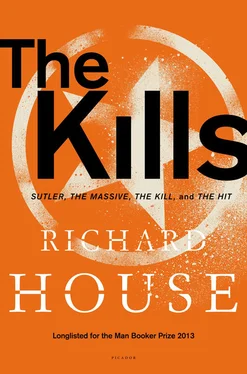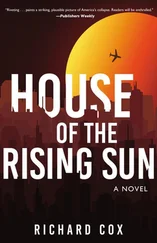Sandro, unshaven, wears a suit, and again has a sloping, apologetic smile. He was in court this morning at the Centro Direzionale, close by the prison. ‘Another world.’ On some other occasion Gibson might like to visit? It is like an office and a church, he says. He asks about the man in Laura’s photograph. Gibson has seen this, yes?
‘I assume you checked the hotels?’
‘We have.’
‘And nothing?’
‘And nothing.’ The man runs his finger under his mouth, pinches his chin as if in thought. ‘If you have the time, you might try Hotel Sette on via Toledo.’ Sandro sits back, assumes his original position, one leg hitched across another, an arm stretched across the chair-back. ‘Sometimes people aren’t so willing to talk with the police. It’s nothing personal, but there are habits, ways in which things are done.’
‘They won’t talk to me.’
‘You underestimate yourself. Information is more available to you as an ordinary man. Go see what they say. Give them a story so they are involved.’
* * *
He finds Hotel Sette on the third floor on via Toledo opposite the Café Roma. He buys coffee after coffee, short espressos, which have no effect and taste charred. He watches the hotel doorway, the shops beneath: a clothing store with a single a white window, brightly lit, a manikin with purple earmuffs dressed in yellow hot pants (isn’t that what they’re called?). To the right a patisserie, dark and old-fashioned, wood and glass. Customers leave with wrapped packages.
Gibson isn’t sure what day this is, he thinks to ask the barista, but doesn’t want to appear foolish. There is no movement in the hotel. The windows, three floors of them, all open with blinds pulled up, but nothing to see, except ceilings, the top corners of rooms. Small, he guesses, and plain.
He has no idea who he’s looking for. Less idea about what to do with the information. He thinks to order another coffee, his fourth, but notices that his hand is shaking. He finds the photo on his phone. It takes a while to remember the sequence (unlock, swipe to the third screen, select the camera …). With the image on view, he props the phone upright on the counter, turns it to the barista, and attempts to explain.
‘This man. He was here perhaps? Did he come to the café? He was staying in the hotel opposite.’
The man leans in to the phone and squints, then shakes his head.
‘I’m looking for my daughter.’
The barista, now attentive, picks up the phone and shows it to the woman behind the counter who gives a long, considered nod.
‘Sure,’ he says. ‘He was here. I remember him. Not so long ago.’ He speaks in Italian to the woman and they appear to disagree. He points to Gibson, to the hotel, to the entrance. ‘This is where he was staying. He was in that room. One, two, three windows.’ He points to the third floor, the window immediately above the clothes shop. He knows the room he says, because the man would watch the street all day.
Gibson isn’t sure who to contact first: Sandro or Geezler.
5.4
The museum isn’t on her way, and Rike arrives with half a mind not to go inside, but the building is dressed with bright banners, and there’s no reason not to now she has walked there and has a free ticket. Besides, any kind of art, pictures of beaches even, pretty domed churches, would be a pleasant change of subject after stories of blood and stories of severed tongues.
She passes quickly through the lobby, seeking the room on the upper floor, but has to ask directions.
The guard points to a poster, right in front of her, with the letters MFP and underneath Mannfunktionprojekt: ‘I want / I wish: One Year of Trouble’. The letters, in a smart unadorned script, promise some style.
The exhibit, on the top floor, is very simple. The grey walls have a brick-red script printed with I want I wish I want I wish I want I wish I want I wish in a solid block, so insistent that ‘I’ looks only to be a separation between ‘want’ and ‘wish’. So emphatic that the words become a simple command.
Centred above the text a smart neon sign announces: One Year of Trouble. Headphones hang by their cords, upside down in a grid, in eight rows of eight. Voices pipe gently into the space announcing dates, a different voice for each day. The days slur one into another. November the twenty-first. November twenty-second, November twenty-third, nineteen eighty-one. Men’s voices, women’s voices, most speaking in English. Not all of the headphones play in sync, on one set, in the centre, other voices are superimposed, giving dates and explanations: June seven, nineteen ninety-four, my father passed away. June eighth is the anniversary of my divorce. June ninth, I failed my final exams. June tenth, two thousand and nine, I had an unsuccessful operation on my lower spine. She listens on, November, December, January, the days run chronologically through random years, and on February twelfth she recognizes his voice. Tomas Berens. Short, but distinctive. A date with no explanation.
Surprised to hear Tomas’s voice, Rike instinctively turns about, checks the entrance, checks the corners, not expecting him to be in the room, but out of self-consciousness, as if she has been caught prying. She waits, listens to the year count back to February twelfth, many of the dates are missing, the cycle is incomplete. His voice repeats. She’s less certain the second time.
In the corner of the room is a small booth. In a statement the artists ask that you record a date, and if you like, a short reason.
She stands on tiptoe when she records her message. Most of the days record deaths, which makes her reluctant to add another. October twenty-fifth, two thousand and seven. To the memory of Tobias Georg Bastian. One ear to the headphone, the other poised at the microphone.
As soon as she is finished she feels her voice recede, become indistinct, one among many messages, and then she worries that her sister might hear this, or Henning. But the idea no longer belongs to her, and she feels a detachment, as if, in some small way, she has somehow shed the date and its associations. The machine beeps once, and Rike is offered the choice to save or delete the message.
She chooses delete. This is not her information to tell.
* * *
Rike returns to the apartment clear about her decision not to save the message, but still feels part of the piece. Neither Isa nor Henning would want to hear the message, and she is not sure that she would care to share the information with Tomas. There is too much of an imbalance. Tomas knows basic facts about her — opinions and trivia — the bones of the past five years, but Rike knows little about Tomas.
* * *
Isa wants to know if Rike has gone through any of Henning’s papers. At first it’s a clear question, without blame. The papers were on the table. Did she look at them? Rike says she didn’t, of course she didn’t. She asks what papers Isa is talking about, there was nothing on the table this morning, nor last night, as far as she can remember, except his briefcase.
‘That’s what I’m talking about. The papers were in his briefcase.’
Now Rike is alarmed. Isa should know she wouldn’t go through Henning’s papers, and she would certainly never search through his briefcase.
Isa folds her arms. It doesn’t make sense then. ‘He has information about Parson. He was sent some photographs.’
Rike doesn’t quite see what she’s being asked. ‘And are they missing?’
Читать дальше












